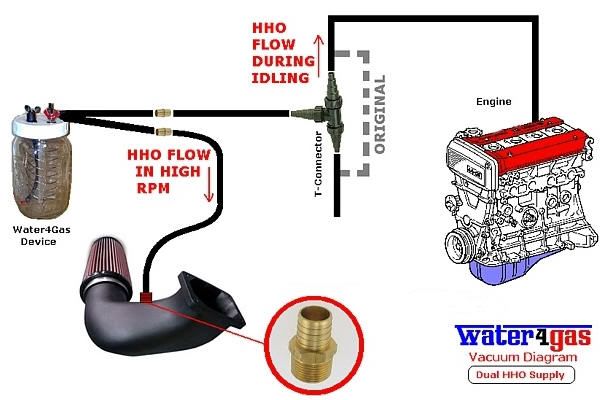- Sat Mar 06, 2010 7:33 am
#179489
chrono404 wrote:What it does is put more of a loud on your alternator as its vaporizes water. then as your car runs it sucks the oxygen/hydrogen from the vaporizer. Then it makes your car run lean.
This will burn out your o2 sensor, put more load on your engine. Running lean will make your engine run hot, which can burn up your piston rings, and valves.
Basically, You can only hurt your car and its Engine by installing this on your car.
There is a guy who does this to old american cars locally. 
Chrono, you're right to an extent. It does put an extra load on the alternator. But it doesn't burn up the O2 sensors. (Not to sound nit-picky or anything, but the system doesn't vaporize the water, it electrically seperates the two hydrogen atoms from the one oxygen atom by a process called elecrtolysis.)
The stoichiometric equasion for a proper AFR with a hydrogen system is roughly 22:1. That's a very lean mixture by all means. The problem with this is trying to get enough hydrogen extracted from the water in order to produce such a ratio. I don't remember exactly how much water needs to be broken down, but it's a huge number. Yes I realize it's two parts H, one part O, but that is it. Let's look at a gas powered internal combustion engine, we'll say a typical Chevrolet 350ci small block with a stock 4bbl carburetor flowing 600cfm at WOT. 600 CUBIC FEET PER MINUTE is a huge number. If you divide that into 23 parts (22 parts air, 1 part hydrogen), that's 574CFM of oxygen, 26CFM hydrogen. Again, to generate that much hydrogen and oxygen would be literally impossible for the alternator to handle that as a bolt on. Not to mention the amount of water you'd have to have onboard would be insane. Then there's the compression ratio and ignition timing...
Now, I realize I just went on about a straight hydrogen system. The concept still applies to the hydrogen injection system that lots of people are bolting on to their gas internal combustion engines. You still have to generate enough hydrogen to make even a noticeable boost in fuel economy. Most people who put these systems on their cars tend to start driving more conservatively because they're paying closer attention to the fuel economy. When these people see the slightly boosted fuel economy, they automatically attribute that directly to the hydrogen injection system.
It's 1:30am. I'm tired. If I've left any holes, let me know. I looked at putting one of these on my '94 DC4 way back when, but upon further research I deemed it pointless...
Hi, I'm John. I'm a hacky sackin', rock climbin', scuba divin', aircraft mechanic.





